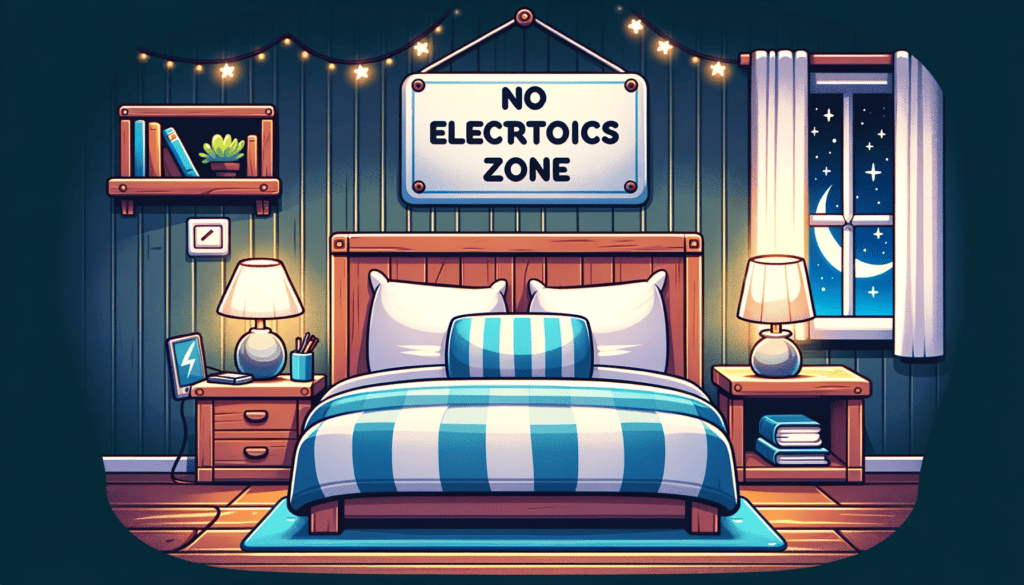
The Dangers of Electronics in the Bedroom
Understanding the Risks of Electronic Devices
Many of us are guilty of using electronic devices right before bed or even keeping them on our beds while we sleep. While it might seem harmless, this habit poses several risks. From physical dangers to health implications, the impact of this seemingly innocent practice can be significant.
Physical Hazards: More Than Just a Tripping Risk
Keeping electronic devices in your bed can lead to physical hazards. The risk of overheating and causing fires is real, especially when devices are left on beds or under pillows. There’s also the possibility of accidental damage to the device or injury to yourself if you roll over onto a hard or sharp object.
Health Implications of Electronic Devices in Bed
Sleep Disruption and Blue Light Exposure
Electronic devices emit blue light, which can interfere with your sleep cycle. This type of light suppresses the production of melatonin, the hormone responsible for regulating sleep. As a result, using these devices in bed can lead to difficulties in falling asleep or experiencing restful sleep.
Electromagnetic Field (EMF) Exposure
Another concern is the exposure to electromagnetic fields (EMFs) emitted by electronic devices. While the health effects of long-term EMF exposure are still being studied, it’s better to err on the side of caution, especially during the time when your body is resting and repairing itself.
Mental Health and Electronics at Bedtime
Impact on Relaxation and Stress Levels
Your bedroom should be a sanctuary for relaxation. However, the presence of electronics can turn it into an extension of your work or social life, leading to increased stress and anxiety levels. This constant connectivity can prevent your mind from unwinding and affect your mental well-being.
The Influence on Children and Teenagers
For children and teenagers, the impact is even more pronounced. Excessive use of electronic devices in bed can affect their developing brains, leading to issues with attention, learning, and emotional regulation.
Practical Consequences of Electronics in Bed
Reduced Productivity and Focus
Using electronics in bed can lead to a decrease in productivity and focus the next day. Poor sleep quality affects your ability to concentrate and perform tasks efficiently, impacting your professional and personal life.
Dependency and Habit Formation
There’s also the risk of forming a dependency on electronic devices. This habit can be hard to break and might lead to a cycle where you rely on these devices for relaxation, only to find that they have the opposite effect.
Safety Concerns and Electronics
Fire Hazards and Overheating
Electronics can overheat, especially when covered by bedding, increasing the risk of fires. This is not just a theoretical risk – there have been numerous reports of fires caused by overheated electronics in beds.
Electrical Safety and Device Damage
There’s also the issue of electrical safety. Spillages or accidental contact with water can lead to electric shocks or damage to the device, posing a danger to you and your property.
Psychological Effects of Screen Time Before Sleep
The Impact on Sleep Quality and Mood
The light and stimulation from screens can significantly impact your sleep quality, mood, and overall mental health. It’s essential to understand how these devices affect your brain and body, especially in the hours leading up to bedtime.
Creating a Stressful Sleep Environment
By keeping electronic devices in your bed, you’re essentially inviting stress and stimulation into a space that should be reserved for rest and relaxation. This can create a cycle of poor sleep and increased stress.
Better Sleep Practices
Establishing a No-Electronics Zone
One of the best practices for improving sleep is to establish your bedroom as a no-electronics zone. This means removing TVs, computers, and mobile devices from your sleeping area and finding alternative ways to wind down before bed.
Healthy Bedtime Routines
Developing a bedtime routine that promotes relaxation and good sleep hygiene is essential. This might include reading a book, meditating, or practicing gentle stretches. The key is to find activities that help you unwind without relying on electronic devices.
Alternatives to Electronics in Bed
Relaxation Techniques and Sleep Aids
Instead of turning to electronics, consider using relaxation techniques or sleep aids that are conducive to good sleep. This might include white noise machines, sleep-friendly lighting, or guided meditation.
Engaging in Non-Screen Activities
Engaging in non-screen activities before bed can also be beneficial. This could include reading, journaling, or gentle physical activities like yoga or stretching.
Conclusion: Making the Change for Better Sleep
Embracing a Healthier Sleep Environment
It’s clear that keeping electronics on your bed while sleeping is a bad idea. By understanding the risks and making a conscious effort to change your habits, you can improve your sleep quality and overall health.
Things to Consider for a Restful Night
As you work to remove electronics from your bed, consider the benefits of a restful night’s sleep. Improved mood, better focus, and a healthier lifestyle are just a few of the advantages that await when you prioritize your sleep environment.
Now, let’s enhance this article with a colorful and cartoony DALL-E image that reflects the theme of keeping electronics away from the bed for better sleep.






Leave a Reply